Before I knew it, a year had quickly passed, and I was already packing my luggage in preparation for my second trip to Africa. Since my first trip to Senegal, I have constantly relived the experience, and I longed to return to witness the change that had completely transformed me . This year, I was fortunate enough to join the surgical team in a continued effort towards providing medical and surgical relief towards the underdeveloped communities we would encounter.
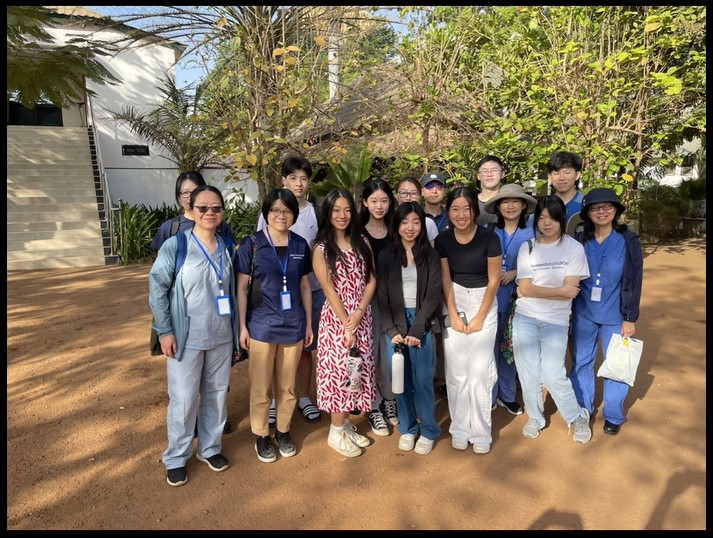 Arrived in Senegal safely for my second volunteer year.
Arrived in Senegal safely for my second volunteer year.
Again, the trip begun immediately at the airport; we were tasked to haul the various bags of heavily weighted medication bags through security– medication donated by pharmaceutical companies to be used during clinical work on the trip. At the airport, the reunion with my friends was one that I was greatly looking forward to– friends who I continued to keep in close contact with since meeting them last year– and what had also sparked immense excitement and anticipation for the coming trip.
Arriving in Senegal, I felt a wave of nostalgia as I had embarked on this trip the year before and had grown familiar to both the youth group who returned from the previous year, and the immediate duties that needed to be performed before we begin the free clinic. This included setting up the pharmacy that we eventually ran, done so by unpacking each large bag of medication and meticulously sorting each pill bottle into individual packages based on dosage and prescription amount. We worked tirelessly within a small classroom of the base camp’s school, which was eventually turned into consultation rooms for the volunteer physicians.
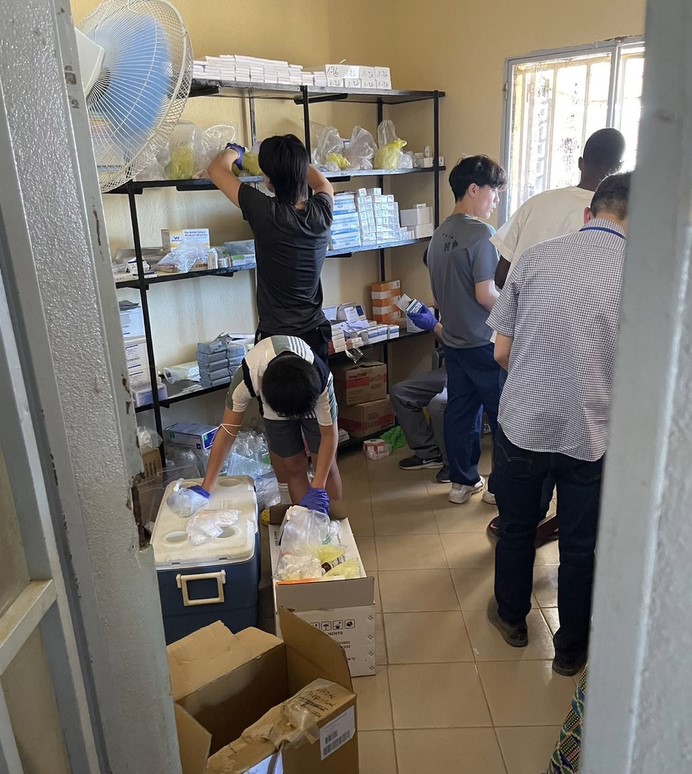 Unboxing the medicines to be dispensed in the free clinic.
Unboxing the medicines to be dispensed in the free clinic.
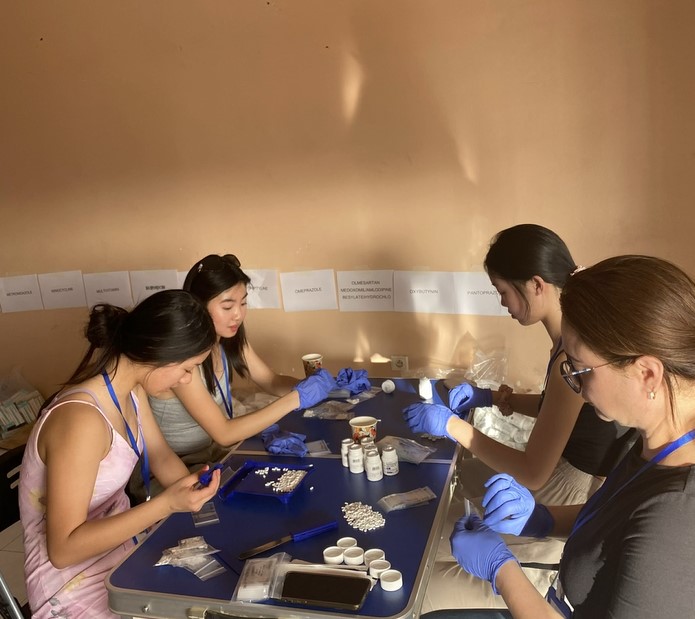 Sorting out specific medicines and re-packing them accordingly.
Sorting out specific medicines and re-packing them accordingly.
The next few days, I was able to help run the small makeshift pharmacy, where I handed the prescribed medications to each patient that consulted our clinic. Under the hot Senegal sun, each clinic quickly became packed and difficult to manage due to the language barrier between us and the local patients, and it was often hectic and disorganized. I was eventually allowed to prescribe certain medication myself to the patients due to the immense demand for medical attention– an aspect that was both exciting but challenging. Many patients came in for general pain, and under guidance, I was able to categorize what medications to give for common complaints of patients, mostly acetaminophen for pain.
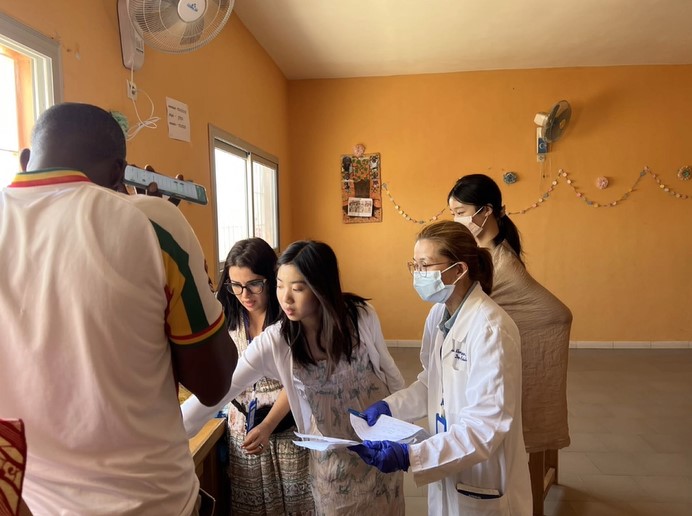 Handing out medicines prescribed to a local patient.
Handing out medicines prescribed to a local patient.
My time in the clinic also involved learning of the local culture, joining the locals and volunteers in the base camp’s kitchen each night to share food and language. This was an aspect of the trip that I found immense comfort and joy in; the kitchen staff was more than welcoming, and offered with open arms to have me join the kitchen each night. When I put on the hair net and the gloves, it was as if the language barrier disappeared– it felt like a family, a community, as we sliced fruit and vegetables, and I was even able to learn how to make a traditional Portuguese cheese bread. As the aromas filled the kitchen, there was a magic to the community that touched me in so many ways.
I soon boarded a bus to join the surgical team to a hospital after staying at the base for several days, located just two hours away from the city of Dakar. Entering the hospital for the first time felt surreal; we quickly put on hair nets, masks, and shoe covering and walked through the sandy, open halls of the building. I saw old vitals machines covered and medical equipment covered in a thick layer of dust, and rows and rows of patients lining the floors of the hallway. The operating room was illuminated by two overhead lights, and we immediately began to unpack equipment. During my shadowing experience, I was able to witness the miraculous procedures of several C-sections, hysterectomies, myomectomies, and even perineal tears, and even being able assist as a circulating nurse for many of the surgeries. This involved handing the correct instruments and sutures needed for an efficient surgery– a role that was initially extremely stressful, but I quickly became familiar with the various threading sizes and terminology of the vast amounts of equipment laying in front of me. I learned, however, that we lacked numerous surgical tools and even the proper hygienic procedures that would be the “standard” and “strict” protocol back home in America. However, in many of these communities, this form of medical care is an extreme privilege.
During my time in surgery, I was also able to learn even more about the female reproductive system, eventually becoming rather familiar with the physiology as we completed procedures. Learning outside of the classroom and through a surgical experience was unlike anything I had ever experienced, and it was exciting to delve into the world of both surgery and anesthesiology through hands-on experience. Between surgeries, student interns were able to practice inserting IVs into one another, and even the various knotting techniques for sutures. One of the most riveting parts of the experience was being able to talk with the young female surgeons who led the youth group; their stories and experiences have been extremely inspiring and I am so grateful that this internship has provided me with relatable role models as my passion for medicine grows.
However, there is a specific moment on this trip that still seems to stay with me to this day, a moment that had completely changed my life, and I know will remain close to my heart as I dive into my passion in medicine: When the cold hand had grasped my arm, I saw a look in the young woman’s eyes that was so desperate and intense that it was almost difficult for me to look away. There was something almost primal and raw in the way she grabbed me, as if it were a yearning for comfort and connection. Her surgical gown hung loosely around her slim body, her hair braided into a knot, and I felt the cold metal of the hospital bed that remained unmoving in the center of the room.
A small, dim light hung above, illuminating the space in a cold light, and the slight whirring of the ventilating machine exhaled its heaving sighs in the corner. The smell of iodine pierced the air as doctors paced back and forth through the tiny operating room, handling metal and looming silence in a veil of held breaths and low whispers. I was completely entranced by the process that seemed to blur before me: a meticulous procedure that paralleled an assembly line of sanitization, equipment, and the insertion of various tubes into the small of the back of the patient– the vulnerable woman– in front of me. The cold, shivering touch seemed to snap me back into the gowned patient in front of me who, in the moment, seemed so childlike and small. I was quickly informed that the patient was a young mother, barely the age of twenty just three years older than I– and had come in for a hysterectomy due to uterine complications. She spoke in a frenzied French, her hand clenched, her eyes ablaze. I desperately wished I had paid more attention in my French classes in school, and only picked up on the words douleur for pain.
In the small operating room in rural Senegal, there was nothing but needle against skin, void of any form of pain medications and proper hygiene equipment. I felt a complete hopelessness, a pull within my very being to bring this woman into my arms and hold her. I reached out and grabbed onto her weak shoulders, and in an instant, she wrapped her arms around me and buried her head in my shoulders. I felt her body violently shake every time the doctor, kneeling behind her, twisted the tube within her skin. It felt like hours had passed, and she moaned in excruciating pain. The guttural cry sent shivers in my body, and I began to whisper to her words– English words– hoping that any form of distraction could bring temporary solace. I told her about my life in America, which suddenly felt awfully insignificant and horribly privileged in all ways. I told her about my friends, my boyfriend, and school. I told her about my passions in life, my family, my dog.
I didn’t stop talking, but I felt a sadness that I had never felt before; this was a young girl, her skin a different color, her story vastly different from mine, but she could have been me, and I could have been her. She was a mother, a spirit of bravery and resilience, and I was simply a high school student who seemed to worry too much about grades and school back home in San Diego. I felt her body gradually relax as we sat side by side, arm in arm against the beeping of the machine and the silence of the room, a slowing silence that felt like it was just me and her in the vastness of the world. This single moment of human connection that touched my soul and has never left me since. I knew she didn’t understand my words, but when she looked up, her eyes conveying any form of gratitude that her words could not reach, I truly had felt like I had changed someone’s life.
Being faced with this disparity was extremely humbling and I still hold onto that feeling of gratitude of being able to become a part of a larger effort to provide healthcare to communities that need it most. This is an experience I will hold dearly and consider a major catalyst in my ambitions of becoming a surgeon. This trip, in a way, was absolutely life changing. Not only did I gain a newfound appreciation for my life back in America, but I also realized that medicine truly involves a long-term commitment to change. It became clear that my journey into a healthcare career was not just about providing immediate relief but contributing to long-term, systemic changes that could uplift communities. I was able to witness firsthand the transformative capacity of compassion and empathy, and it was this lesson forged during the mission that has pushed my passion into creating meaningful change in the world of healthcare
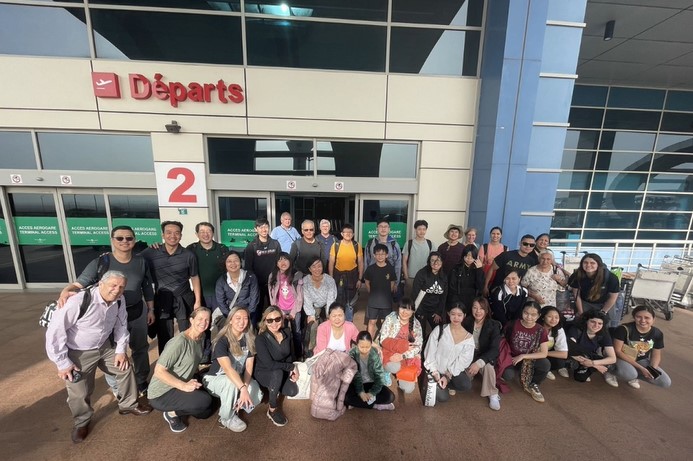 Departing Senegal after a humbling and enriching experience.
Departing Senegal after a humbling and enriching experience.
———————————————————
If you feel moved to support our ministry in Africa, please contact us:
Jun Xu’s WeChat: jun9174343767
电子邮件:Africacriesout@gmail.com
Public WeChat account: LifeExploring (人生天路)
Website: https://africacriesout.net
Editors in charge: Cao Juanjuan, Zhang Kun
Translator: Zhi Hua Duan
English editor: Xi Wang
Editor: Doris Cruz
